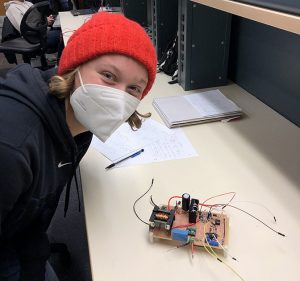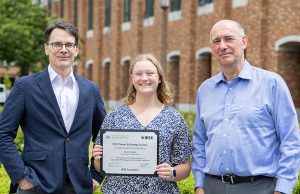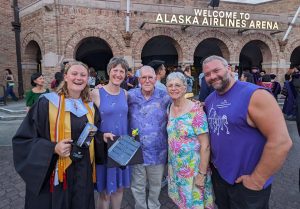By Wayne Gillam | UW ECE News

Margot Adam (BSEE ‘23) graduated from UW ECE with a concentration in sustainable energy systems. Now, she is pursuing a doctoral degree at Princeton University, focusing on ways her engineering knowledge and training could help inform public policy applicable to renewable energy. Photo provided by Margot Adam
Much of the dialogue surrounding renewable energy today is about how to efficiently produce more of it through devices such as solar panels, wind turbines and even nuclear reactors. But not as much public attention has been directed toward the economics, policies and regulations surrounding sustainable energy systems. These factors influence and impact not only renewable energy production, but also how this power will be distributed and who will have access to it across electrical grids that span cities, counties, states, and even nations.
Recent UW ECE alumna Margot Adam (BSEE ‘23) is a devoted student of this subject. She has spent countless hours learning about sustainable energy systems as an undergraduate student and research assistant in the lab of UW ECE Professor Daniel Kirschen. She also has received several scholarships and honors for her academic achievements while in the Department. Now, she is pursuing a doctoral degree at Princeton University, focusing on ways she can use her technical knowledge and an engineering background gained at UW ECE to help inform public policy applicable to renewable energy production, distribution and access.
“I am really looking forward to developing tools and publishing articles that can be useful for people interested in this field and those doing policy research work,” Margot said. “I’m just getting started on the first year of my five-year doctoral program, so, right now, the possibilities seem endless when it comes to academic and career goals.”
Margot’s graduate studies are in the Princeton School for Public and International Affairs. There, she is a Science, Technology, and Environmental Policy Fellow studying how government policies can be used to implement clean energy goals and how innovative energy technologies can affect policy.
From high school to UW ECE

Margot Adam next to a circuit board she constructed with a fellow student as part of an EE 452 class lab. Much of Margot’s education at UW ECE took place during the COVID-19 pandemic, when opportunities to work in-person in research labs became scarce. Despite this environment, she managed to secure a position as an undergraduate research assistant in the lab of UW ECE Professor Daniel Kirschen. Photo provided by Margot Adam
Margot knew in high school that she wanted to pursue engineering. She was active in a robotics club, and she participated in the Running Start program at North Seattle College, which allowed her to complete college credits while still in high school. She said that she was initially drawn to the UW because it is a large, research-driven, public institution with a strong engineering program. It also happened to be located in Seattle, her hometown.
In 2019, Margot was admitted Direct to College in the UW College of Engineering, and she joined UW ECE spring quarter of her sophomore year. Initially, she planned to study robotics, but after looking into career options more in-depth, she began to have second thoughts.
“I heard a lot about warehouse robotics and robots for Boeing and things like that, but I wasn’t sure if that was the impact I wanted to have with my career and where I wanted to specialize,” Margot said. “I wanted to have a broader impact on something I believed was truly positive in the world, something that dealt directly with people’s livelihoods and their ability to thrive in our communities.”
A self-starter, Margot contacted several labs in the College, looking for an undergraduate research experience that might be a good fit for her. In hindsight, she said that her initiative was important to helping her realize her academic goals. For example, she had taught herself how to code in Python for her high school robotics projects. This skill, along with a natural inquisitiveness and willingness to seek out help and information when needed, supported rapid academic progress — even through the COVID-19 pandemic, when opportunities to participate in research labs in-person became scarce.
Undergraduate research, an internship and a real-world contribution

Margot Adam received two IEEE Power and Energy Scholarships during her time at UW ECE. Here, she is receiving the certificate for her 2022–23 IEEE Scholarship from UW ECE Professor and Chair Eric Klavins (left) and Professor Daniel Kirschen (right), who is director of the REALab at the UW and was a mentor to Margot. Photo by Ryan Hoover / UW ECE
Midway through her sophomore year, Margot came across a link on the UW ECE website to Kirschen’s Renewable Energy Analysis Lab, which is known as the REALab. This lab focuses on how to build a smart electrical grid that maximizes the amount of energy produced from renewable sources while maintaining reliability of the electricity supply. She emailed Kirschen, letting him know that she was a new ECE student interested in sustainable energy systems and undergraduate research opportunities. According to Margot, Kirschen was very helpful. He quickly found a position for her in his lab and connected her with UW ECE graduate student Lane Smith to oversee her work.
“Working with Lane was great,” Margot said. “He and Dr. Kirschen created a self-paced environment for my research project, so I could take it whichever direction I wanted, while still being able to focus on my classes.”
In the REALab, Margot worked on developing an environmentally realistic model for solar panels. She used Python to model a solar cell and then scale that up into a solar array, which allowed her to see what the output of solar panels would look like under different weather conditions. She said that her experience in the REALab laid a strong foundation for her studies, and it provided validation that the path she was on was the right one.
While at UW ECE, Margot received two Institute of Electrical and Electronics Engineers (IEEE) Power and Energy Scholarships, one in her junior year and one in her senior year. She also became a member of Tau Beta Pi — The Engineering Honor Society, which recognizes academic achievement, and IEEE Eta Kappa Nu (IEEE-HKN), which is IEEE’s honor society recognizing those who have achieved high scholarly standing within electrical engineering.
From January to March 2023, she studied abroad in Bangalore, India, with the UW’s Grand Challenges Impact Lab. The experience reaffirmed her interest in pursuing a career in policy development for renewable energy.
“During my time in India, I saw how social and technical organizations could be blocked from effectively doing their work by political, economic, and social environments, even in crucial systems, such as food, water, and energy,” Margot said. “This helped me truly see the importance of policy in a technical world and how important it is for energy systems.”
Margot’s work in the REALab and connection with Kirschen also led to an internship with the Energy Reliability Council of Texas, or ERCOT, during the summer of her senior year. While at ERCOT, Margot worked with the regional power transmission planning team and built software tools in Python that the group could use to better manage and organize their data collected about the state’s electrical grid. The team ended up adopting Margot’s software solution and integrating it into their everyday workflow.
Looking forward to a bright future at Princeton and beyond

Margot Adam and her family at the 2023 UW ECE Graduation ceremony and celebration. Margot is holding her Graduation cap, which is outfitted with solar panels and a small propellor. Photo by Collin Sturdevant.
During her senior year at UW ECE, Margot took a graduate-level course, EE 553 — Power Systems Economics, which is taught by Kirschen. The course uses as its text “Fundamentals of Power System Economics,” an influential book in electrical engineering, which was co-written by Kirschen. The course examines the economic structure of power systems and seeks to bridge the gap between engineering sustainable energy systems and surrounding markets and government policies. Margot said that the course inspired her to pursue graduate-level studies focused on policies important to renewable energy development. She also noted that Kirschen was instrumental in helping her to reach her academic goals.
“Dr. Kirschen absolutely was a great mentor for me, and he was a great professor,” Margot said. “He worked with my learning style and was incredibly supportive during office hours. He also wrote letters of recommendation to help me gain internships and get into grad school.”
Today at Princeton, Margot is focused on achieving her doctoral degree. She said that she is developing her critical thinking skills so that she can conduct research relevant to society. According to Margot, part of the reason she decided to pursue graduate studies at Princeton was because their program and labs are actively expanding to include international groups in power system modeling. This assists students with building models that can inform energy policies both in the United States and abroad.
Career pathways Margot is looking into include working for policy think tanks, such as the Environmental and Energy Study Institute, and consulting groups that do similar work with real-world applications. Another avenue she mentioned as a possibility after receiving her doctoral degree was to pursue a career with the U.S. Department of Energy, which produces energy policy and regulations.
“During my time at UW ECE, I was able to develop my knowledge and skills. The experience inspired me to look at things in new ways, and that was partly what spurred me on to study energy policy,” Margot said. “Going forward, I would like to be a part of ensuring that energy is something that can be enjoyed by everybody, regardless of location or economic status. I want to help shape policy and systemic change in order to enable accessible, affordable, reliable and sustainable energy for all.”
Learn more about Margot Adam in her LinkedIn profile and about Professor Kirschen’s sustainable energy systems research and the REALab on his UW ECE bio page. Information about the Sustainable Energy Systems pathway for undergraduate students can be found in the Bachelor of Science in Electrical and Computer Engineering pages on the UW ECE website.

